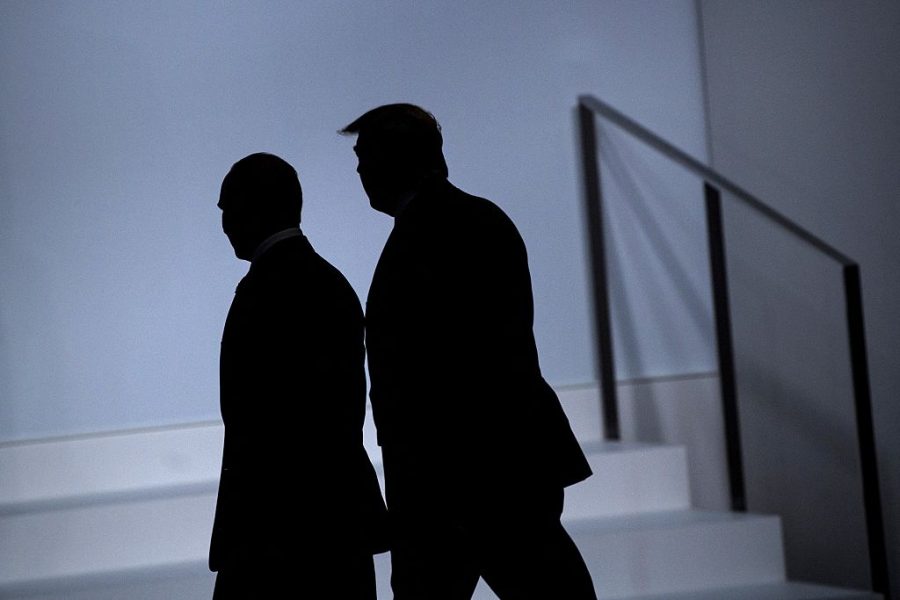Let the trolling begin. Chicken Kiev was the airline meal served to the first planeload of Russian diplomats, government officials and journalists as they flew to Anchorage, Alaska. Russia’s veteran foreign minister Sergei Lavrov arrived dressed in a white sweatshirt bearing the logo ‘CCCP’ – or USSR in Cyrillic. Russian State TV viewers have been treated to video montages of the greatest moments of US-Russian cooperation, from astronauts meeting in the Mir space station to soldiers embracing on the Elbe river in 1945. The US side, by contrast, has done their bit to make the visiting Russians feel unwelcome by billeting the Kremlin press corps in a sports stadium equipped with army cots, flimsy cloth partitions, and too few electrical sockets.
Trump is not entirely the useful idiot that the Kremlin seems to take him for
Petty mutual insults aside, Putin has in many ways already got what he wanted even before he sits down with Trump. The pomp and security theatre of a great international summit underscores Putin’s senior place in the pantheon of world leaders. Europe’s heads of government have to crowd on an hour-long conference call to get Trump’s ear. Putin, by contrast, is important enough for the president of the world’s most powerful country to fly high hours from Washington to meet him.
Respect and face time are what Putin has always craved most, and in speeches and historical essays he has often complained that the West has consistently snubbed and disregarded Russia. With the Anchorage summit, Putin at last has secured Trump’s undivided attention – for a few hours at least.
When it comes to the actual talks, however, there’s ample scope for a derailment. Both sides fundamentally misunderstand the other’s position. Trump, perhaps naturally for a former real estate mogul, seems to believe that Putin’s primary interest is taking Ukrainian territory. That’s not the case.
What Putin truly cares about – and has repeatedly demanded – is the removal of Ukraine as a strategic threat to Russia. That, in practice, means not only keeping Ukraine out of Nato but also restricting the size of its military and restoring the rights of Russian speakers, Russian-language broadcasters and the Russia-oriented wing of the Ukrainian Orthodox Church. Putin, in short, is fighting to make Ukraine a docile ally and part of Moscow’s political and economic sphere of interest.
Putin, for his part, believes that Trump is mostly interested in money, deals and enriching his friends. To that end, Putin has brought along not only his top diplomats but also his finance minister Anton Siluanov, who has played a key role in Russia’s largely successful effort to sidestep western sanctions. By dangling the prospect of joint ventures with US companies to open up Arctic gas fields and other multi-billion dollar baubles, Putin believes that he can bamboozle Trump.
But Trump is not entirely the useful idiot that the Kremlin seems to take him for. In recent weeks Trump has accused Moscow of feeding Washington ‘a lot of bullshit’ and threatened ‘serious consequences’ if Putin does not agree to a ceasefire.
It is easy to forget that the principal reason the two leaders are meeting today in Anchorage is because of Trump’s as-yet unfulfilled threat to impose devastating secondary sanctions on countries that import Russian oil and gas. But rather than actually follow through on that ultimatum – which would involve the US effectively launching a trade war on Russia’s main customers India, China and the EU – Trump chose to call a summit rather than be seen to be chickening out.
By Trump’s account, the Anchorage talks are a ‘feel-out’ to determine whether a peace deal is possible. Putin, for his part, has welcomed Trump’s ‘positive engagement in the peace process’ – without apparently shifting an inch on his basic demands for Ukraine’s surrender. The key question will be whether Putin has got the message that Trump’s famously prickly ego demands concrete results, not more ‘bullshit’.
Putin’s own ego, no less prickly and enormous than Trump’s, demands that any concessions be framed as a deal and not as something dictated by the Americans. Hence the raft of economic proposals that Siluanov will be bringing to the side talks with the White House team. Then there is a raft of unfinished business between Washington and Moscow concerning strategic nuclear weapons, most urgently the New START treaty that both sides have abandoned and which formally elapses in 2026. Space cooperation is another area where Putin can happily sign on the dotted line.
The one deal that the two men will not be doing today in Anchorage – at least according to Putin’s spokesman Dmitry Peskov – is a grand deal ending the war in Ukraine. But there is hope that the Alaska summit could at least be the beginning of the end.








Comments